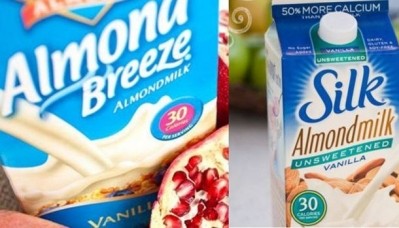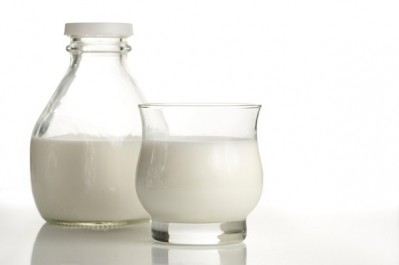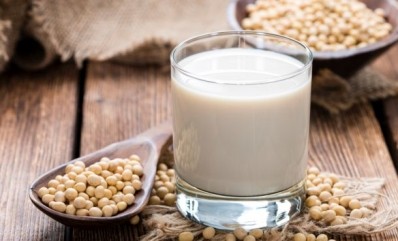Almond Breeze almond milk only contains 2% almonds, claims false advertising lawsuit
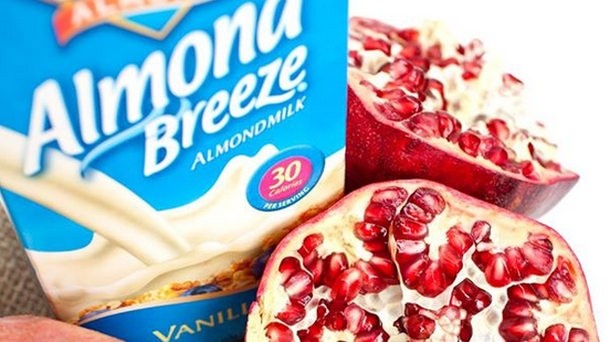
In the amended false advertising lawsuit*, filed in New York on July 14, plaintiffs Tracy Albert and Dimitrios Malaxianis argue that Blue Diamond falsely portrays its best-selling Almond Breeze almond milk as being made primarily from almonds, when - they allege - it contains only 2% almonds and is mostly made from water, sugar, carrageenan and sunflower lecithin.
The case has echoes of the high profile POM v Coke lawsuit (which ended up in the Supreme Court) in which POM Wonderful accused Coca-Cola of misleading shoppers by marketing a beverage comprised almost entirely of apple and grape juice as a ‘Pomegranate Blueberry flavored blend of 5 juices’ (the juice contained just 0.3% pomegranate juice and 0.2% blueberry juice).
The Blue Diamond lawsuit does not state the exact percentage of almonds a reasonable consumer would expect to see in a commercial almond milk product.
However, it notes that “upon an extensive review of the recipes for almond milk on the internet, the vast majority of the recipes call for one part almond and three or four parts water, amounting to 25-33% of almonds [editor's note: correct figure would actually be 20-25% almonds using these ratios].”
BD is ‘leading people to believe that the products are made primarily from almonds’
The phrase ‘Made from real almonds’ coupled with multiple pictures of almonds on the packaging also reinforces the notion that Almond Breeze is mostly made from almonds, says the lawsuit, again echoing the arguments made by POM Wonderful.
“Blue Diamond is selling products that are branded as almond milk and leading people to believe that the products are made primarily from almonds when the products only contain 2% of almonds.”
It goes on to note that carrageenan – a seaweed-based food ingredient widely used for its gelling, thickening and stabilizing properties - has been “linked to cancer", a statement it does not support with any scientific data beyond a news article quoting the Cornucopia Institute, which has been heavily criticized by industry experts for spreading misinformation about carrageenan (click HERE).
What is in almond milk?
According to the Blue Diamond website, the ingredients list for Almond Breeze original (shelf stable) almond milk is: Almondmilk (filtered water, almonds), evaporated cane juice, calcium carbonate, sea salt, potassium citrate, carrageenan, sunflower lecithin, vitamin A palmitate, vitamin D2, d-alpha-tocopherol (natural vitamin E).
UK advertising watchdog comfortable with 2% figure
Blue Diamond does not disclose how much almond is in Almond Breeze in the US. However, the ingredients list for original Almond Breeze on the UK website provides a number for the UK product: Almonds (2%), which the plaintiffs in the US lawsuit have seized upon.
Focusing on the small amount of almonds in almond milk is a new line of attack for plaintiff’s attorneys in the US, who have historically targeted almond milk companies for using the term ‘milk’ to describe a non-dairy beverage, or ‘evaporated cane juice’ to describe sugar.
However, the almond level issue has come up in the UK.
In 2012, for example, shoppers complained to the UK Advertising Standards Authority (ASA) that Alpro UK (owned by WhiteWave Foods) was misleading shoppers by calling its products ‘almond milk’ when it contained just 2% almonds.
However, the ASA said most shoppers understood that you needed to add a fair bit of water to create almond milk:
“We considered that, whilst consumers might not be aware of exactly how almond milk was produced, they were likely to realize… that the production of almond milk would necessarily involve combining almonds with a suitable proportion of liquid to produce a 'milky' consistency.”
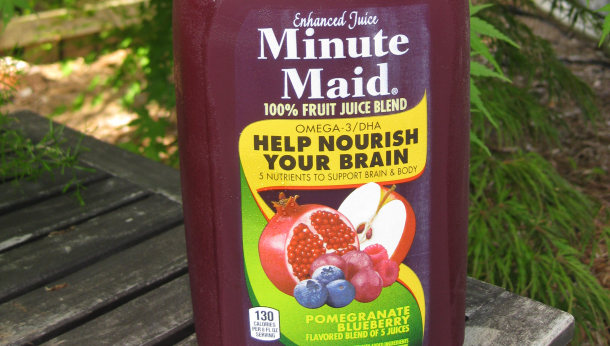
Attorney: I expect to see similar lawsuits in the future
So what do food law attorneys make of the case?

David L. Ter Molen, a partner in the Chicago offices of law firm Freeborn & Peters LLP, told FoodNavigator-USA that he saw clear echoes of the POM v Coke lawsuit:
“In both instances, the lawsuits claim that a product’s name highlights one or more ingredients that only make up a small fraction of the product, and thus misleads consumers into believing that the product is primarily made from those ingredients.
“These cases are also similar in that the ingredients on the name were alleged as being healthy and thus attractive to the consumers. This lawsuit therefore likewise alleges that consumers allegedly purchased the product based on the belief that it was a healthy and premium product.”
The rise and rise of almond milk
According to IRI multi-outlet data, US retail sales of almond milk rose from $686.6m in 2013 to $946m in 2014 (refrigerated: $854.3m + shelf-stable: $91.7m), a 38% rise. Volumes rose 28.4%. However, if you include sales from outlets not covered by IRI such as Whole Foods, ALDI and Trader Joe’s, Packaged Facts estimates 2014 sales were likely closer to $1.19bn.
According to Packaged Facts, almond milk is taking share from dairy milk but also from soy milk, sales of which plummeted 16.1% to $346m in 2014.
He added: “Plaintiff’s line of attack for this specific product is relatively new and the Supreme Court’s decision in POM Wonderful v. Coca-Cola, even though it involved a Lanham Act claim, will make it difficult for Blue Diamond to avoid the lawsuit on a motion to dismiss.
“I expect to see similar lawsuits in the future involving products having ingredients in their names where the product allegedly only contains a small amount of that ingredient.”
Adam Fox, managing partner in the Los Angeles office of law firm Squire Patton Boggs, told us: “The plaintiff’s approach in this case is not dissimilar from that taken in other putative consumer class cases as well as Lanham Act controversies targeting beverages, baby food or other products marketed with imagery and labels that may suggest the presence of certain—or certain threshold quantities of—fruit or fruit juices that may not match up to reality. The real question, aside from the veracity and merit of the claim, is whether similar actions will continue to be brought and whether competitors will see a threat or an opportunity in them."
Blue Diamond: Cow's milk can be 85-85% water
Meanwhile, Blue Diamond told us that the primary ingredient in most leading beverages - from cow's milk to soy milk and almond milk - was water: "At Blue Diamond, we’re proud to deliver Almond Breeze to a very loyal and growing base of customers seeking alternatives to dairy and soymilk.
"The primary ingredient in nearly all popular beverages including coffee, tea, soda, juice and sports drinks is water. Cow’s milk is 85% to 95% water and the same can be said for most soy and almond milks which is why our brand is not alone in responding to recent claims.
"Almond Breeze is made with water, carefully selected almonds and quality ingredients using a unique formula. Specifics regarding our formulation and processing techniques are proprietary but we list all our ingredients and nutritional information on our product label."
*The case is Tracy Albert and Dimitrios Malazianis et al vs Blue Diamond Growers filed in the southern district of New York, Case 1:15-cv-04087-VM
Read about a near-identical suit filed vs Silk - another leading almond milk brand - filed by the same legal firm (James C Kelly of New York).
